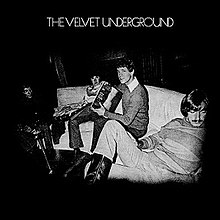Candy Says
| The Velvet Underground | ||||
|---|---|---|---|---|
 |
||||
| Studio album by The Velvet Underground | ||||
| Released | March 1969 | |||
| Recorded | November–December 1968 | |||
| Studio | T.T.G. Studios, Hollywood | |||
| Genre | ||||
| Length | 43:53 | |||
| Label | MGM | |||
| Producer | The Velvet Underground | |||
| The Velvet Underground chronology | ||||
|
||||
| Singles from The Velvet Underground | ||||
|
||||
| Professional ratings | |
|---|---|
| Review scores | |
| Source | Rating |
| AllMusic | |
| Blender | |
| Boston Phoenix | |
| Chicago Tribune | |
| Encyclopedia of Popular Music | |
| Pitchfork | 10/10 |
| Q | |
| Rolling Stone | |
| The Rolling Stone Album Guide | |
| The Village Voice | A |
The Velvet Underground is the self-titled third album by American rock group the Velvet Underground. Released in 1969, it was their first record with Doug Yule, who was a replacement for John Cale. Recorded in 1968 at TTG Studios in Hollywood, California, the album's sound—consisting largely of ballads and straightforward rock songs—marked a notable shift in style from the group's previous recordings. In 2003, the album was ranked number 314 on Rolling Stone's "500 Greatest Albums of All Time" list.
Lou Reed, the group's main songwriter, said of the album: "I really didn't think we should make another White Light/White Heat. I thought it would be a terrible mistake, and I really believed that. I thought we had to demonstrate the other side of us. Otherwise, we would become this one-dimensional thing, and that had to be avoided at all costs." Drummer Maureen Tucker said, "I was pleased with the direction we were going and with the new calmness in the group, and thinking about a good future, hoping people would smarten up and some record company would take us on and do us justice." Doug Yule said the album "was a lot of fun. The sessions were constructive and happy and creative, everybody was working together."
The Velvet Underground was the band's first album for MGM Records, its first two albums having been issued on Verve, an MGM subsidiary. The previously strong Andy Warhol influence is diminished, with the most notable ties to the Factory being the cover and back photographs taken by Warholite Billy Name, and the opening track "Candy Says" about Warhol superstar Candy Darling (who reappears in Reed's 1972 song "Walk on the Wild Side"). The song was sung by Yule at Reed's insistence. The LP sleeve was designed by Dick Smith, then a staff artist at MGM/Verve, with Billy Name's photo of the band sitting sedately on a couch at Andy Warhol's Factory.
...
Wikipedia
